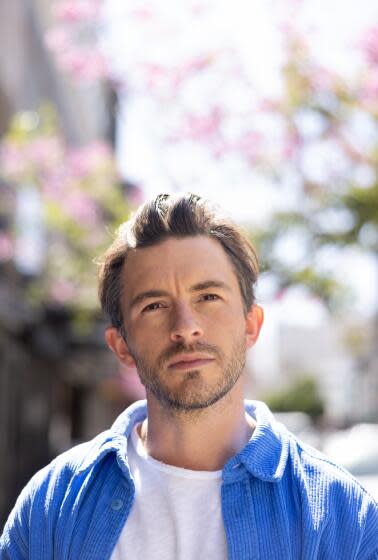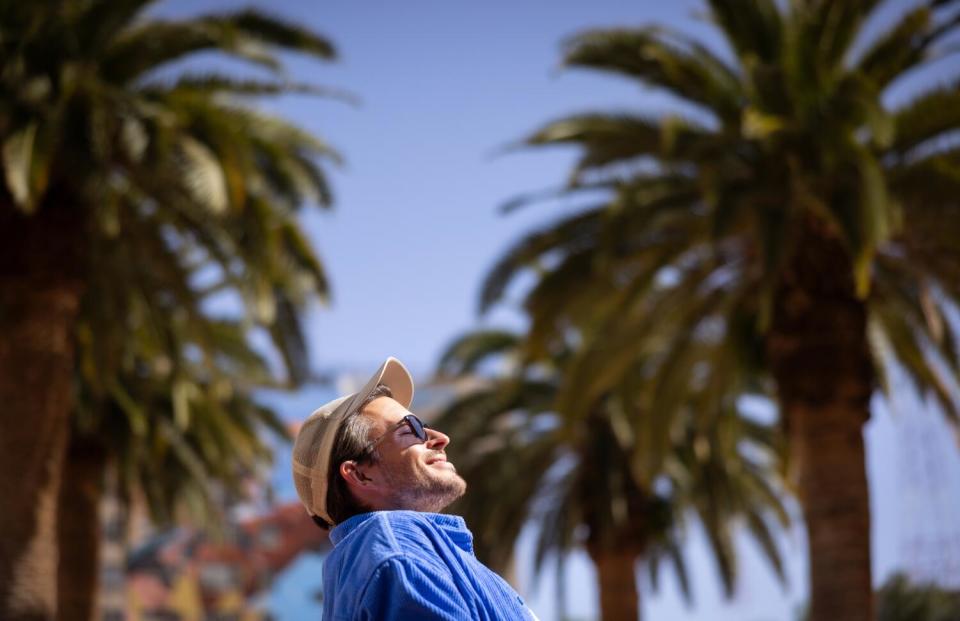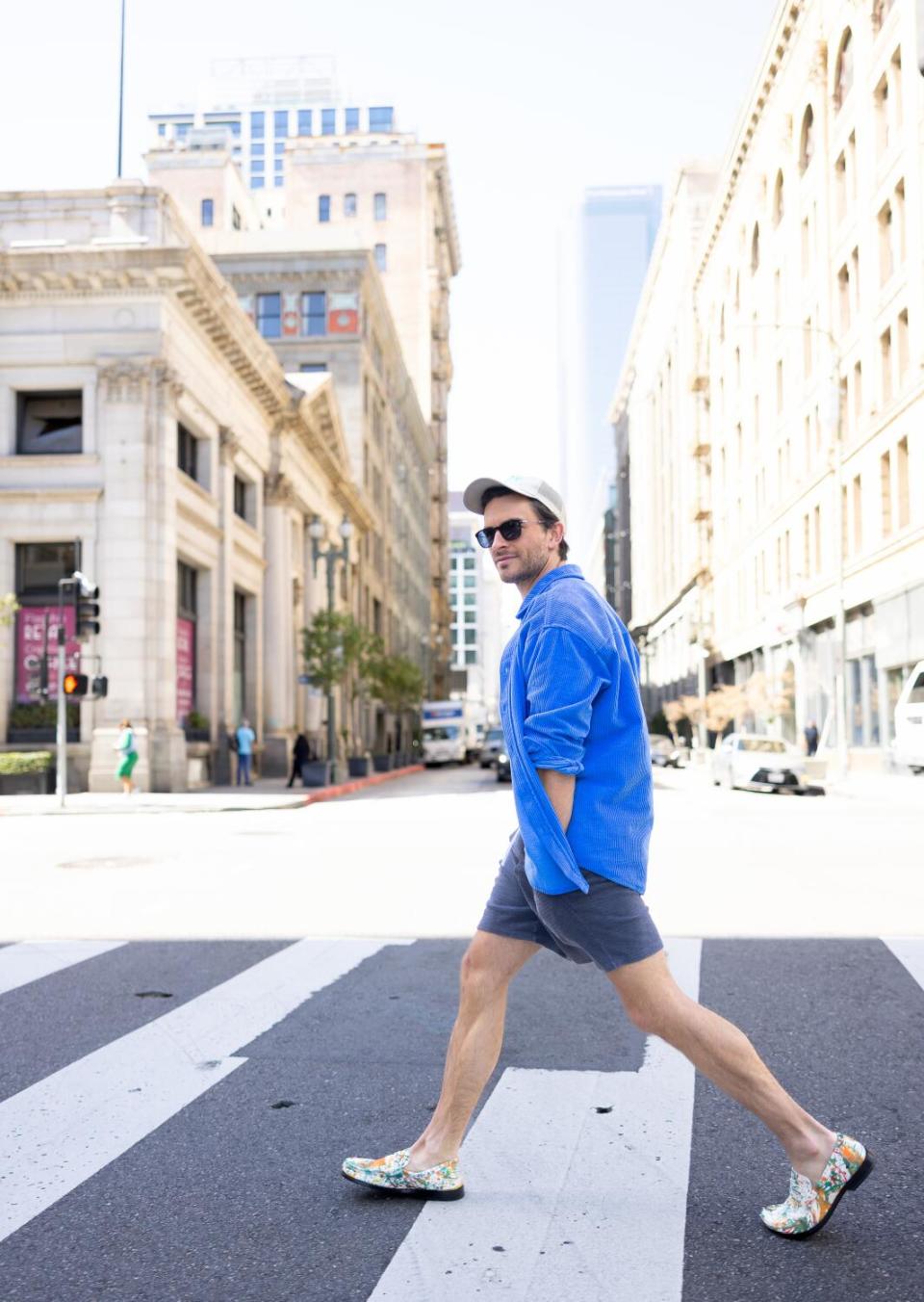Jonathan Bailey doesn't like to bare it all. But vulnerability fueled his best performance yet
- Oops!Something went wrong.Please try again later.
- Oops!Something went wrong.Please try again later.
- Oops!Something went wrong.Please try again later.

"This is where all the cruising happened."
Jonathan Bailey and I are standing in Pershing Square on a bright, blustery spring afternoon, nearing the end of a homemade queer history tour of downtown L.A.: One Magazine, Cooper Do-Nuts/Nancy Valverde Square, the Dover bathhouse, the Biltmore Hotel and this, the city's former Central Park, a haven, since before World War I, for "fairies" and "sissy boys," servicemen on leave and beatniks on the road.
"Is it still happening now?" he asks.
"Probably not as much," I venture.
"Well, you let me know if it's happening," he teases, a mischievous smile lighting up his face.
Bailey understands the uses of the charm offensive. As Sam, the handsome Lothario of Phoebe Waller-Bridge's delightful pre-"Fleabag" curio, "Crashing"; Anthony, the romantic hero of "Bridgerton's" second season; and John, the jerk of a protagonist in Mike Bartlett's love triangle play "Cock," the English actor, 36, has swaggered up to the precipice of superstardom. With roles in such studio tentpoles as "Wicked" and "Jurassic World" on the horizon, he may just break through. Yet he delivers career-best work in Showtime's queer melodrama "Fellow Travelers," as anti-Communist crusader-turned-gay rights activist Tim Laughlin, by leaving behind the self-assured rakes and tapping a new wellspring: soft power.
Read more: Commentary: McCarthyism makes us agents in our own destruction. 'Fellow Travelers' shows how
Tim may be, as Bailey puts it, "an open nerve," but as it turns out, the devout Catholic and political naïf — who falls for suave State Department operative Hawkins "Hawk" Fuller (Matt Bomer) just as Sen. Joseph McCarthy tries to purge the federal government of LGBTQ people — is formidable indeed.
Stretching from the Lavender Scare to the depths of the AIDS crisis, in scenes of tenderness, cruelty and toe-curling sex, Bailey's performance communicates that little-spoken truth of relationships: It takes more strength to submit than it does to control. The former demands discipline, courage, trust; the latter requires only force.
"In 'Bridgerton,' [Bailey] is like a Hawkins Fuller character — he is very sexy and has lots of power, has that kind of confident charisma that absolutely is not Tim at all," says "Fellow Travelers" creator Ron Nyswaner.
But any doubt about Bailey's ability to mesh with Bomer, who boarded the project early in development, was put to bed with the actors' virtual rehearsal of a meeting on a park bench in the pilot. "'Well, that's a first,'" Nyswaner recalls an executive texting him. "I cried in a chemistry read."
'Am I inviting people in?'
Bailey grew up in a musical family in the Oxfordshire countryside outside London, and this, coupled with an appreciation for the morning prayers, choir practice and Mass he attended as a scholarship student at the local Catholic school, fed his precocious talents. ("I loved the performance of it," he laughs. "Not to diminish the celebration of religious process, but I did love the idea of wearing a gown.") By age 10, he'd appeared in the West End, playing Gavroche in a production of "Les Misérables," an experience he now recognizes as an encounter with a queer found family — albeit one shadowed by the toll of the AIDS crisis, which peaked in the U.K. in the mid-1990s.
"When I'm asked about my childhood, there's so much I don't remember, and I think that's true of anyone who's been in fight or flight for 20 years," he says. "I would have been in a cast of people whose friends would have died in the last seven years. I think of where I was seven years ago. I had all my gay friends then. It's only retrospectively that I can retrofit a real gay community around me [in the theater], that I just wasn't aware of [then]."
During the late 1990s and early 2000s, American and British culture presented queer adolescents with a bewildering array of mixed signals. As beloved celebrities came out in growing numbers, and the battle for marriage equality became a central locus of LGBTQ political organizing, the media continued to propagate harmful stereotypes of gay men as miserable, lonely, perverted or worse — and, Bailey remembers, callously turned George Michael, arrested on suspicion of cruising in a Beverly Hills restroom in 1998, and Irish pop star Stephen Gately, who revealed his sexuality in 1999, fearful he was about to be outed, into tabloid spectacles.
No wonder Bailey, like many LGBTQ people of his generation, should feel the "chemical" thrill of "validation and acceptance" during London Pride at age 18, then embark on a two-year relationship with a woman in his 20s.
"Dangerously, if you're not exposed to people who can show you other examples of happiness, you think that's the easiest way to live," Bailey says. "It's funny. You look back and you can tell the story in one way, which is that I always knew who I was and my sexuality and my identity within that. But obviously at times, it was really tough. I compromised my own happiness, for sure. And compromised other people's happiness."

Disclosures about his personal life have become particularly thorny for the actor since the premiere of "Bridgerton," the blockbuster bodice-ripper from executive producer Shonda Rhimes.
"The Netflix effect does knock you off center completely," he says, recalling the experience of finding a paparazzo waiting outside his new flat before he'd even moved in. "Suddenly, you do start having nightmares about people climbing in your windows... Even now, talking about it makes me feel like, 'Am I inviting people in?'"
He is also critical of the media for churning out headlines about the smallest details of celebrities' private lives, often detached from their original context. In an interview with the London Evening Standard published in December, Bailey described a harrowing encounter in a Washington, D.C., coffee shop in which a man threatened his life for being queer — and, in recounting the experience, offhandedly mentioned the "lovely man" he'd called, shaken, after it happened. Although Bailey acknowledges that the original story handled the subject with aplomb, he felt dismayed that more attention wasn't paid to the intended warning about rising anti-LGBTQ sentiment: "The only thing that got syndicated from that story was that I had a boyfriend, and it wasn't true," he sighs. "It was kind of depressing, if I'm honest."
Still, Bailey, who once turned down a role in a queer-themed TV series because it would have required him to speed along revelations about his personal life he wasn't ready to make, is prepared to embrace the power of vulnerability when it feeds the work. Although a member of his inner circle expressed doubts about "Fellow Travelers'" steamy sex scenes, for instance, the actor intuited that they were what made the project worth doing: "I was like, 'I'm telling you, they are the reason why this is going to be brilliant.'"
'He's changed my trajectory in my own life'
To those who would complain about the state of sex in film and TV, "Fellow Travelers" is the perfect riposte. All of it matters, from Tim's first flirtation with Hawk to the finale's closing minutes, because the series, at its core, is about the importance of soft power: the strength required to bend, but not break; to adapt, but not abandon oneself; to survive without shrinking to nothing in the process. And depicting that through sex, specifically gay sex, makes "Fellow Travelers" radical indeed.
Bailey understands that baring so much comes with certain risks. When I tell him that research for the story has filled my algorithmic "For You" feed on X (formerly Twitter) with speculation that his onscreen relationship with Bomer has a real-life element, he notes that "shipping" fictional couples and costars alike has long been part of Hollywood fantasy. But he bristles at the implication that he and Bomer are anything but skilled actors at work.
"I would love for people to know that the success of our chemistry isn't based on us f—. It's actually about us leaning into the craft," he says. "It's a vulnerable situation to be in, talking about it on record. I don't want to rob people of their thoughts. But I do have a set of values, and as an artist, you don't need to be f— to tell that love story."
Underlying that craft, Bailey adds, is the confidence to speak up, as with one scene in "Fellow Travelers" that was adjusted because he said, "I don't want to be naked today." He learned to use his voice the hard way: In his early 20s, he recalls, he was once "bullied" on set when "someone was threatened" by him and vowed to himself, "I'm never going to do that to someone. I'm never going to allow that to happen."

This impulse to direct his influence in support of others has blossomed further with "Fellow Travelers." On the day of our interview, Bailey enthuses about an upcoming meeting with legendary gay rights activist Cleve Jones and shares his idea for a docuseries recording the stories of elders in the LGBTQ+ community while they are still here to tell them. He describes lying in a hospital bed on set on World AIDS Day, in character as Tim, surrounded by gay men who had lost friends and lovers during the crisis, and finding himself thinking, "What do I want to leave behind?"
"I think he's changed my trajectory in my own life," Bailey says.
This is, perhaps, the most common reaction I know to diving deep into queer history — the understanding that we, like our forerunners, are responsible for shaping the queer future, whether in politics, society or art. No one is going to do it on our behalf.
As we stand on the nondescript corner now named for her, I relate the story of the late queer activist Nancy Valverde, who was arrested repeatedly while a barber school student in the 1950s on suspicion of “masquerading” because of her preference for short hair and men’s clothing, and later successfully challenged her harassment by the police in court.
"What a hero!" Bailey exclaims, wondering at Valverde's bravery. "The thing that's so interesting with power battles is, ultimately, identity is the thing that gives you the most strength and power in your life, isn't it?
"Because that's one thing people can't take away from you: who you are and how you express yourself."
This story originally appeared in Los Angeles Times.

